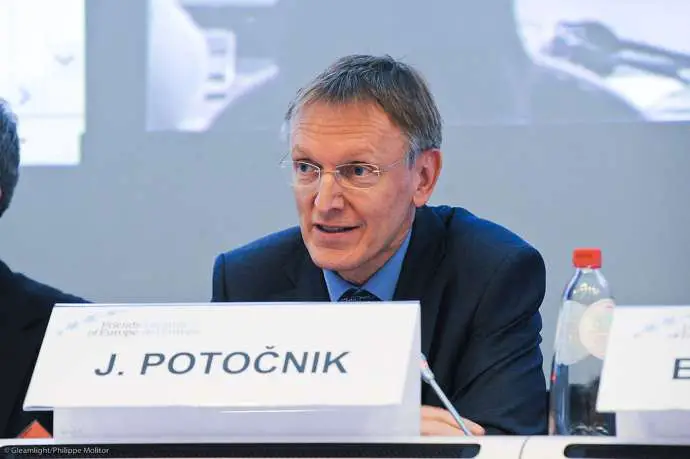STA, 28 April 2019 - Slovenia is seen as a stable, constructive and pro-European country which however does not fully use the potential it could to play the role a small country can play in the EU, Slovenia's former European Commissioner Janez Potočnik has told the STA ahead of the 15th anniversary of the country's EU accession.
"We don't use to the fullest the role small and less exposed countries can play in the EU and we're also not among those which would attract attention with acts which are not in line with European values."
Since joining the EU on 1 May 2004, Slovenia has achieved a lot of what it had aspired to, and many of these things are now taken for granted, says Potočnik, who now co-chairs the UN International Resource Panel.
As Slovenia's chief negotiator in accession talks with the EU, Potočnik looks back at the process of negotiations with satisfaction.
"The unity we managed to build was genuine and convincing. It wouldn't be realistic to expect something similar now, as the clear goals uniting us are no longer there."
Nevertheless, there are too many disagreements and divisions, says Potočnik, who first served as research commissioner and then as environment commissiner in the 2004-2014 period.
It sometimes seems as if Slovenia artificially creats problems to fuel divisions, which Potočnik says are in the interest of those who do not have enough knowledge and strength to address complex challenges of the times we live in.
While he is happy Slovenians are still well aware of the advantages of EU membership, he is worried that some are too much focussed on the past, which is interpreted to one's liking, which prevents Slovenia to close ranks and take a step forward stronger.
"I miss strategic reflections and more focus on the problems which are really important for our future and on which we should really reach a compromise.
"I'm also worried about the divisions surrounding the migration issues and even whether it is sensible to be part of European organisations."
For him, Slovenia's major challenge, especially with a view to its EU presidency in 2021, is the same as for the EU and the world - a transition to an economically, socially and environmentally sustainable economy.
"This should undoubtedly become the priority of our EU presidency. If it doesn't, we'll send out a message ... that we don't understand what the key challenges of the EU and the world are and that we are a country which does not belong to the core of those in the EU pushing for a transition to the world we want, need and deserve."
The historic Big Bang 2004 expansion of the EU has largely eliminated post-WWII historical divisions in Europe, but also taught us that democratic change does not come with administrative measures and by formally adjusting to EU law, says Potočnik.
"It takes time and hard work to overcome development mistakes from the past and the interests surrounding them. EU membership is an important factor of democratic stabilisation but does not protect us from fully from our own mistakes."
Looking at the prospects of new rounds of enlargement, Potočnik says the EU is currently actually shrinking, while there is little going on enlargement-wise.
He points to Brexit, saying it is a sad event, especially because we live in a time which calls for deepening cooperation.
While he admits there are several reasons for the EU being busy dealing with itself rather than focussing on enlargement, such as migrations, security and bad experiences with some of the countries joining the bloc in 2004, Potočnik says it is still not acceptable Europe's stability depends on the stability of the Balkans.
He believes the recent name change agreement between Greece and North Macedonia should be used to "actively revive the enlargement process".
Also, Slovenia and Croatia should resolve the border issue on the basis of the legally binding arbitration agreement, which he says is a much easier problem to solve than some other issues in the region.
Potočnik also hopes the environment and sustainability in general will come to the forefront of this year's campaigning for the elections to the European Parliament.
Slovenia is dealing with climate change, yet not well enough, he says, adding the issue should have played a more prominent role during the 2018 campaign for Slovenia's general election.
Given that Potočnik has served two terms as European commissioner, his name has come up for the new make-up of the European Commission due later this year.
He says he would think it over if offered the post, but adds that he has not discussed it with Prime Minister Marjan Šarec or anyone else.
All our stories on Brexit are here, while all those on the European Union are here






